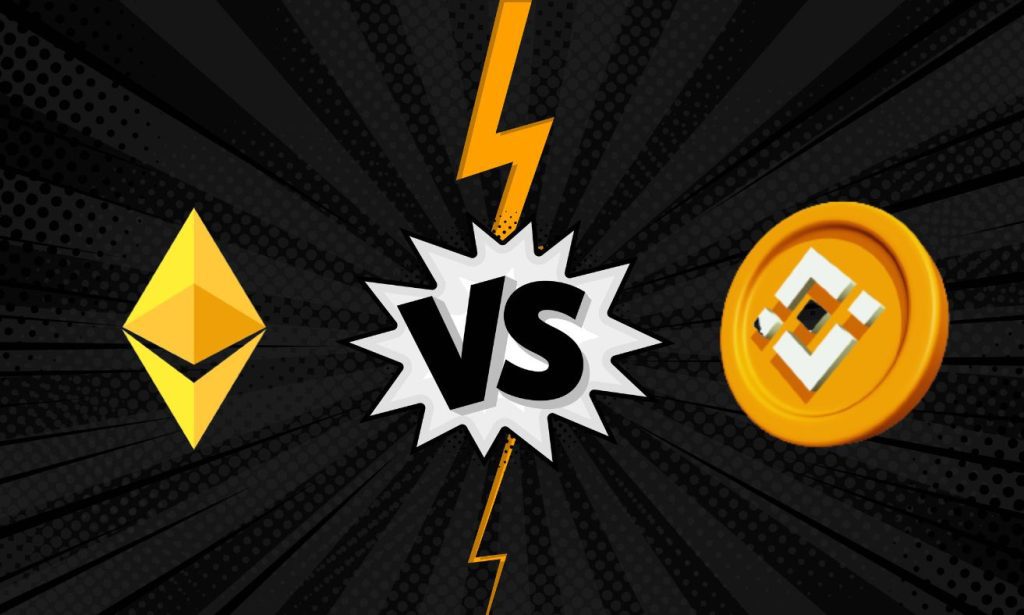It’s a crypto-showdown! BNB Smart Chain and the Ethereum Network are two major players in the crypto world. Both offer advanced blockchain platforms, but they’re not just two peas in a pod. There are striking differences between them that could influence your choice depending on your needs. From the consensus mechanisms they adopt to the transaction fees and times, the DApps they support, and even their approach to DeFi, BNB Smart Chain vs Ethereum, each have their unique selling points. Let’s peel back the layers and explore these differences.
A Brief Introduction to BNB Smart Chain and Ethereum
Let’s kick things off by getting to know our contenders. Ethereum, the brainchild of Vitalik Buterin, has been around since 2015 and is often considered the second-most important blockchain platform after Bitcoin. It introduced the concept of smart contracts into the blockchain world, enabling developers to build and deploy decentralized applications (DApps). It’s a pioneer, a trendsetter.
BNB Smart Chain, on the other hand, is a fresh face in the arena. Launched by Binance, the world’s largest cryptocurrency exchange, in September 2020, BSC is a dual-chain architecture that empowers its users to build DApps and digital assets on one blockchain and take advantage of the fast trading performance offered by the other. It’s fast, it’s efficient, and it’s rapidly gaining ground.
DApps and Active Addresses: Comparing Blockchain Traffic
Think of DApps and active addresses as the hustle and bustle of a city. The more there is, the more vibrant the city. In the case of BSC and Ethereum, this vibrancy is reflected in the number of DApps they host and their daily active addresses.
Ethereum is like a bustling metropolis. With over 3,000 DApps and approximately 500,000 daily active addresses, it’s a hive of activity. From games and decentralized exchanges to lending platforms and prediction markets, Ethereum’s DApps cater to a wide array of needs. It’s a hub of innovation and creativity.
BNB Smart Chain, though younger, is quickly building up its cityscape. Hosting more than 600 DApps and boasting around 350,000 daily active addresses, BSC is rapidly becoming a hotbed for DeFi applications, thanks to its low transaction fees and high performance. It might not match Ethereum’s numbers just yet, but it’s definitely making its mark.
DeFi DApps Showdown: Ethereum vs. BNB Smart Chain
DeFi, or Decentralized Finance, is the poster child of the blockchain world, and DApps are its star players. Ethereum and BNB Smart Chain both host a variety of DeFi DApps, but their offerings are as different as chalk and cheese.
Ethereum has been in the game longer and so has a more diverse range of DeFi DApps. It’s the birthplace of big names like Uniswap, Aave, and Compound. These DApps have fundamentally reshaped the financial landscape, offering services like decentralized trading, lending, and borrowing.
BNB Smart Chain, while newer to the scene, has quickly carved out a niche for itself in the DeFi world. Its most successful DeFi DApp, PancakeSwap, has even surpassed Ethereum’s Uniswap in terms of transaction volume on several occasions. This quick rise to fame is mostly due to BSC’s lower transaction fees, which make DeFi more accessible to a wider audience.
Transfers Between Networks: The ERC-20 and BEP-20 Case Study
While both Ethereum and BNB Smart Chain support tokens that comply with their respective standards – ERC-20 for Ethereum and BEP-20 for BSC – transferring tokens between the two networks isn’t as straightforward as you’d think.
ERC-20 tokens are native to Ethereum, and BEP-20 tokens belong to BNB Smart Chain. However, many projects issue their tokens on both blockchains. To move tokens from one network to the other, you need to use a bridge service, like the Binance Bridge. It’s a tad bit complicated, but it’s a necessary workaround given the different token standards adopted by each blockchain.
Comparing the Cost: Transaction Fees on BSC vs. Ethereum
Now, let’s talk about money matters – specifically, transaction fees. If there’s one thing that can make or break a blockchain user’s experience, it’s this.
Ethereum, despite its many advantages, has been criticized for its high transaction fees, also known as gas fees. These fees fluctuate depending on network congestion, and during peak times, they can skyrocket. This has led to a lot of grumbling in the Ethereum community and has even prompted some users to switch to other chains.
BNB Smart Chain, on the other hand, is a breath of fresh air when it comes to transaction fees. BSC has consistently lower fees than Ethereum, making it a more affordable option for many users. This low cost, coupled with its high performance, has made BSC an increasingly attractive platform for developers and users alike.
Speed Matters: Transaction Time on BSC and Ethereum
One of the most crucial factors determining a blockchain’s usability is the speed at which transactions are processed. In this section, we’ll look at how BNB Smart Chain and Ethereum stack up against each other in terms of transaction speed.
Ethereum, being a Proof-of-Work (PoW) blockchain, has a block time of about 15 seconds, which means that a transaction can take a few minutes to be confirmed, depending on network congestion but whit the merge in place the process speed up a 25%. While this might have been impressive a few years back, the world of blockchain has moved at a breakneck pace since then.
In contrast, BNB Smart Chain, with its Proof of Staked Authority (PoSA) consensus mechanism, has a block time of just 3 seconds. This means that transactions on BSC are confirmed and finalized significantly faster than on Ethereum, providing users with a smoother and more efficient experience.
PoW, PoS, PoSA: Understanding Consensus Mechanisms
Consensus mechanisms are the heart of any blockchain. They’re what keep the network secure, and they determine how transactions are validated. Ethereum and BNB Smart Chain use different consensus mechanisms, which contribute to their unique characteristics.
Ethereum formerly used Proof of Work (PoW), a mechanism that requires miners to solve complex mathematical problems to add new blocks to the blockchain. However, Ethereum now has transitioned to Proof of Stake (PoS), which is more energy-efficient and scales better.
BNB Smart Chain, on the other hand, uses a hybrid called Proof of Staked Authority (PoSA), which combines elements of PoS and Proof of Authority (PoA). In PoSA, validators are chosen based on the number of BNB tokens they’re willing to ‘stake’ as collateral. This makes BSC faster and more scalable than Ethereum, but some argue it’s also more centralized.
BNB Smart Chain and Ethereum – Similar Yet Distinct
Despite both being blockchain platforms that support smart contracts and DApps, BNB Smart Chain and Ethereum have several key differences. From their consensus mechanisms to transaction costs and speeds, each has its strengths and weaknesses.
Ethereum, the older of the two, is highly decentralized and has a wide array of DApps. But its high transaction fees and slower speeds have been a pain point for users. BNB Smart Chain, while newer and arguably less decentralized, offers faster transaction times and lower fees, making it an attractive alternative for many.
While they share some similarities, in this vs it’s clear that BNB Smart Chain and Ethereum cater to different needs and audiences. As the blockchain space continues to evolve, it will be interesting to see how these two platforms grow and adapt.









